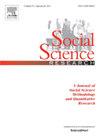父母支持的需求方和供给方观点:家庭之间和家庭内部的不平等
IF 3.5
2区 社会学
Q1 SOCIOLOGY
引用次数: 0
摘要
据信,与过去相比,现在这一代的成年子女在更长时间内依赖父母。父母转移给成年子女的理论往往依赖于需求和供给的逻辑来解释家庭内部和家庭之间的支持不平等。当前的论文使用改进的研究设计来理解四个支持维度的变化:实践,财务,信息和祖父母。随机和固定效应回归模型对荷兰7826对父母中16,603名年龄在18-50岁之间的儿童进行了估计。研究结果显示,对儿童的支持转移强烈依赖于父母的资源和时间限制,证实了供应的作用。家庭内部兄弟姐妹差异的模型显示,父母会将更多的支持分配给有个人问题的孩子和经历过不良生活事件的孩子,这与需求的概念一致。供给侧和需求侧因素对继父母的作用较弱,但对已婚和离异父母的作用相似。供给侧效应增加了后代的不平等,而需求侧效应通过缓和家庭内部的差异来减少不平等。本文章由计算机程序翻译,如有差异,请以英文原文为准。
Demand- and supply-side perspectives on parental support: Inequalities between and within families
Current generations of adult children are believed to rely on their parents for more extended periods of their lives than in the past. Theories of parental transfers to adult children often rely on the logic of demand and supply to explain inequality of support within and between families. The current paper examines these notions using an improved research design for understanding variations in four support dimensions: practical, financial, informational, and grandparenting. Random and fixed-effects regression models were estimated on a sample of 16,603 children aged 18–50 nested in 7826 parents in the Netherlands. Findings reveal that support transfers to children strongly depend on parents’ resources and time constraints, confirming the role of supply. Models for sibling differences within families show that parents allocate more support to children with personal problems and children who experienced adverse life events, in line with the notion of demand. Supply and demand-side factors play a weaker role for stepparents but similar roles for married and separated parents. Supply-side effects increase inequality in future generations, whereas demand-side effects reduce inequality by mitigating differences within families.
求助全文
通过发布文献求助,成功后即可免费获取论文全文。
去求助
来源期刊

Social Science Research
SOCIOLOGY-
CiteScore
4.30
自引率
4.00%
发文量
0
审稿时长
65 days
期刊介绍:
Social Science Research publishes papers devoted to quantitative social science research and methodology. The journal features articles that illustrate the use of quantitative methods in the empirical solution of substantive problems, and emphasizes those concerned with issues or methods that cut across traditional disciplinary lines. Special attention is given to methods that have been used by only one particular social science discipline, but that may have application to a broader range of areas.
 求助内容:
求助内容: 应助结果提醒方式:
应助结果提醒方式:


